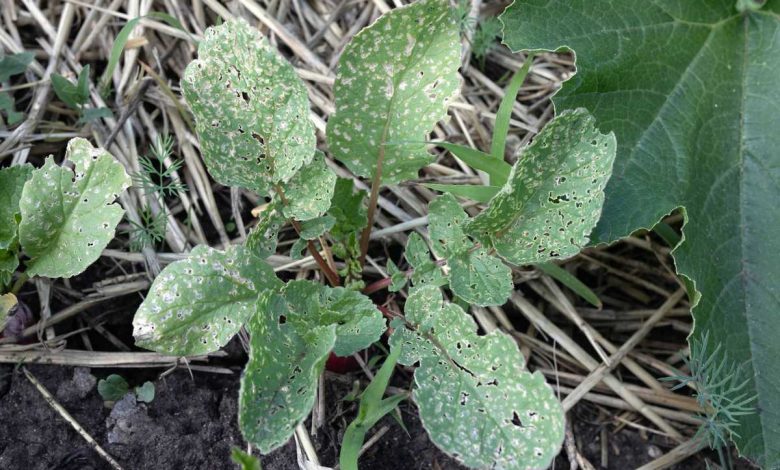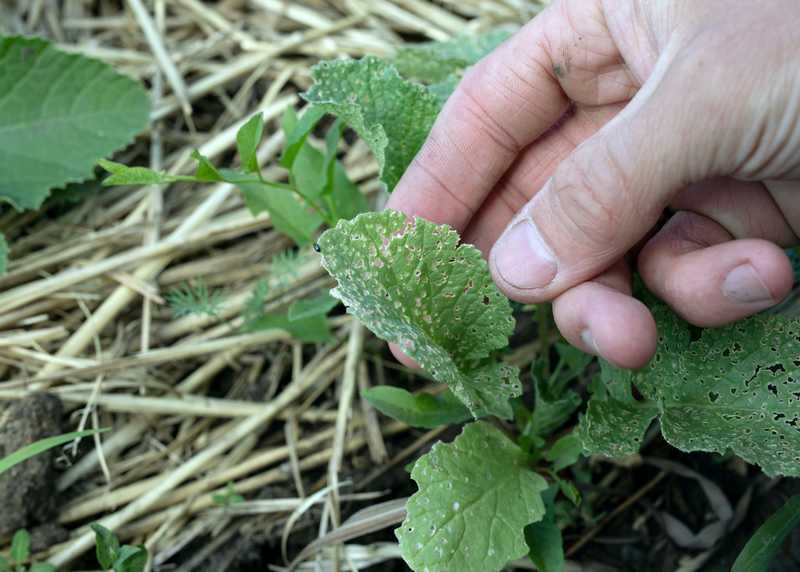
Your radish, cabbage, turnip or arugula leaves have many small holes? No doubt, it is the damage of flea beetles, a small beetle that parasitizes many vegetable plants at the end of spring. Fortunately, there is a remedy: black soap. It allows you to effectively treat your crops against these insect pests.
Black soap, a natural product against flea beetles
Made from potash soap with olive oil, solvent-free, preservative-free, EDTA-free and fragrance-free, black soap is primarily a detergent that has been used for a very long time as a household cleaner.
But its qualities do not stop there. Entirely biodegradable, garden black soap can also be used as a spray on plants to fight naturally and effectively against flea beetles , aphids and scale insects. It can therefore be used without risk in an organic vegetable garden or in permaculture .
Choose liquid black soap instead . It is easier to use and dilute than pasty black soap, even though their insect repellent properties are identical.
Flea beetles, voracious little fleas
Flea beetles , also called earth fleas , are small beetles measuring just a few millimeters. They live and eat almost exclusively the leaves of plants of the Brassicaceae family. (Formerly Cruciferae)
In hot, dry weather , flea beetles begin to multiply and invade plants. Voracious, they sting leaves and tissues to feed on sap or tissue. Infested adult plants show significant round holes and are stressed. Their growth is halted. Seedlings can also be destroyed as soon as they emerge.
Since flea beetles are able to jump and move very quickly from one plant to another, attacks can quickly spread throughout the vegetable patch.
Finally, the sweet droppings of flea beetles, honeydew, also often attract other insects, especially ants.

How does black soap work on flea beetles?
Like all insects, flea beetles do not breathe using lungs, but through a dense network of pores located on the surface of their entire body.
The black soap acts by sticking them , it clogs the pores and asphyxiates them.
How to use black soap on plants against flea beetles?
Easy to use, black soap is a safe product . In the garden, it is never used pure, always diluted in water.
It must be sprayed on plants colonized by flea beetles and aphids as soon as attacks begin.
How to make an insecticide with liquid black soap?
Necessary material :
- Container: bucket, bottle, or spray tank
- Liquid black soap
- Rainwater or non-calcareous tap water
- Spoon for mixing
- Cooking oil (optional)
Start by diluting 5% liquid black soap in lukewarm water, then in cold water. This represents barely a capful of black soap for 1 liter of water .
Depending on the dosage carried out (5 to 10%), 1/2 L of black soap thus makes it possible to treat approximately 100 m² of culture.
Mix vigorously.
Trick :
Before pouring the black soap into the water, add a teaspoon of table oil (rapeseed oil or olive oil) to greatly reduce the formation of foam in the soapy solution and the product to adhere better to the leaves of the plants to be treated.
When and how to spray black soap?
For better effectiveness, the treatment must be carried out early in the morning or in the evening, at the first signs of an attack of flea beetles, from spring to autumn.
Spray the soapy water directly on the plants infested with flea beetles , aphids and scale insects, insisting on the stems and the folds located on the underside of the leaves in order to treat the larvae of the flea beetles which find refuge there.
The action of the black soap is visible very quickly , a few minutes to 1 hour after the treatment carried out. If necessary, if there are still many flea beetles, you can repeat the treatment the following day or after 48 hours, until the disappearance of these insect pests .
Nevertheless, avoid repeated and systematic treatments so as not to destroy auxiliary insects such as ladybug or lacewing larvae.
Just maintain a balance between the health of your plants and a contained flea beetle population that serves as a pantry for beneficial insects. Their help is invaluable, it would be a shame to send them to other gardens!
Other easy ways to control flea beetles
flea beetle don’t like black soap, but they also hate cold water . To scare them away, it is therefore possible to sprinkle the attacked plants early in the morning.
Once the flea beetles are gone, protect your plantation by covering the plants with a forcing veil or an anti-insect net. Of course, this mechanical protection does not prevent a few insects from sneaking in, but it reduces the pressure that this pest imposes on your crops and considerably limits the proliferation of flea beetles and therefore the damage observed.
